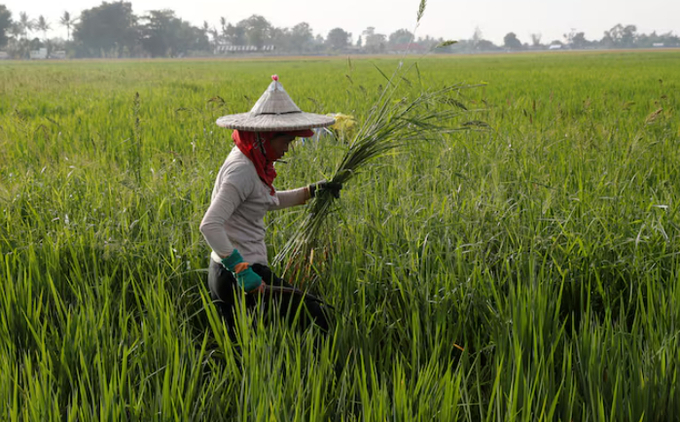November 22, 2025 | 23:04 GMT +7
November 22, 2025 | 23:04 GMT +7
Hotline: 0913.378.918
November 22, 2025 | 23:04 GMT +7
Hotline: 0913.378.918

A farmer removes weeds growing alongside with ride stalks at a ricefield in Naujan, Oriental Mindoro in Philippines, August 27, 2018.
The Philippines, among the world's largest rice importers, declared on Monday a food security emergency to bring down the cost of rice, which it said has stayed elevated despite lower global prices and a reduction in rice tariffs last year.
The declaration, which was widely expected, will allow the government to release buffer stocks to help bring down retail prices of the national staple, Agriculture Secretary Francis Tiu Laurel said in a statement, adding it would remain in effect until the price situation improves.
Despite efforts to liberalise rice imports and reduce tariffs, the agriculture department said, the domestic market has been slow to respond, with retail prices surpassing expectations.
Half of the 300,000 metric tons buffer stock the National Food Authority currently holds could be released over the next six months to ensure supply for emergencies and disaster response, it added.
The annual rate of increase in rice prices in the Philippines hit a 15-year high of 24.4% in March last year, but has since moderated to 0.8% in December, helping keep overall inflation for 2024 within the government's 2% to 4% target.
Last year, the Philippines lowered tariffs on rice and extended existing tariff cuts on some other commodities to combat inflation and ensure ample supply.
(Reuters)

(VAN) More than 100 shoppers queued for a chance to get a kilo or so of Japanese rice for 500 yen ($3.32) by heaping as much grain into a small wooden box as possible.

(VAN) Benchmark international prices of milled declined in October as harvests started or improved in some parts of the globe.

(VAN) Show cause orders will be issued to retailers who sell imported rice at prices exceeding the maximum suggested retail price (MSRP) of P43 per kilo, Philippines Agriculture Secretary said in a statement on Thursday.

(VAN) Coffee prices on October 20, 2025, remained stable domestically, trading at 113,500–114,500 VND/kg. Similarly, global coffee prices also moved sideways.

(VAN) By October, Vietnam’s coffee exports had surpassed USD 7 billion for the first time and will exceed USD 8 billion within this year.

(VAN) Illinois rancher says Texas, Oklahoma, Kansas lost grass and forage, forcing massive cattle liquidation.

(VAN) Coffee prices on October 12, 2025, remained flat, trading at VND 113,000–VND 114,000/kg. This week, coffee prices continued to decline sharply.